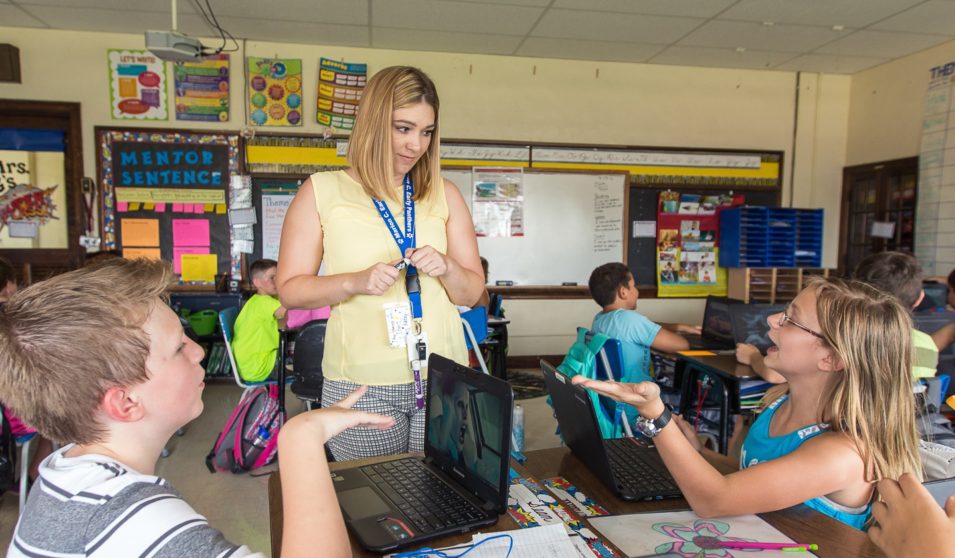Editor's Note: Thank you to the Community Foundation of the Ozarks (CFO) for sharing Matt Lemmon's annual report feature on Ozarks Teacher Corps alum Amy Ginnings. We appreciate our ongoing partnership with CFO, where Matt serves as media director.
On the one hand, it’s on the second story of an old school building, with some exposed piping and an overworked window-unit air conditioner.
On the other hand, technology permeates the room. On every student’s desk is a Chromebook, with desktop images customized to each student’s interests: The Avengers. Strawberry Shortcake. A Ferrari. Today’s focus: The Panther Press, the school newspaper, which Ginnings’ class undertakes as a fall semester project. Groups work on everything from the school’s sports news to a kids’-interest page, collaborating on a single document from their own computers. Giggles break out from time to time as they share messages that may or may not pertain to the task at hand.
“I like thinking up the stories,” says one of Ginnings’ fifth graders. “It’s fun to get out and tell people what’s going on.”
That combination of real-world skills in the context of their hometown is what place-based learning is all about. Ginnings, a 2014 graduate of the Ozark Teacher Corps, knows the concept well. The Teacher Corps is a flagship program of the Rural Schools Partnership, the CFO initiative founded in 2009 to promote placed-based education and the development of assets for rural districts through education foundations.
And now the Rural Schools Partnership and Ozarks Teacher Corps concepts serve as a template for similar national programs. The Community Foundation of the Ozarks and its two signature rural education programs are at the forefront of the new multi-state Rural Schools Collaborative. Led in part by Carol Silvey, CFO senior associate for advancement, Julie Leeth, CFO executive vice president, and Gary Funk, CFO president emeritus, the Rural Schools Collaborative (RSC) is building a network of advocates and organizations that are committed to rural philanthropy, place-based engagement, and the development of teacher-leaders. Classroom teachers from the Ozarks already have been among the recipients of the RSC’s “Grants in Place” grantmaking program. The synergies between the RSC and CFO's Rural Schools Partnership include a merging of websites in early 2016.
Last summer, Ginnings and a handful of current members of the Ozarks Teacher Corps traveled to Dakota Wesleyan University in Mitchell, S.D., for the RSC’s Rural Teacher Corps Project: Stakeholder Dialogue. Education advocates from nine states — from California to the Dakotas to Alabama — met to discuss teaching in rural districts. Ginnings participated in a panel of educators with formal rural education training. Workshop sessions focused on the biggest issues facing rural teachers. Perhaps unsurprisingly, they found many needs were the same, including pay discrepancies, student poverty and the difficulties feeling at home in a new, small community.
Ginnings and her Ozarks counterparts have a leg up on those issues, however, thanks to the training and continuing education the Ozarks Teacher Corps provides. The payoff: a 92 percent placement rate since the first OTC class graduated in 2011, resulting in scores of young educators who not only know how to navigate a 21st century classroom in a rural place, but actually want to be there.
And that, in our opinion, is front-page news.
You can find more on the Rural Teacher Corps concept, here.




